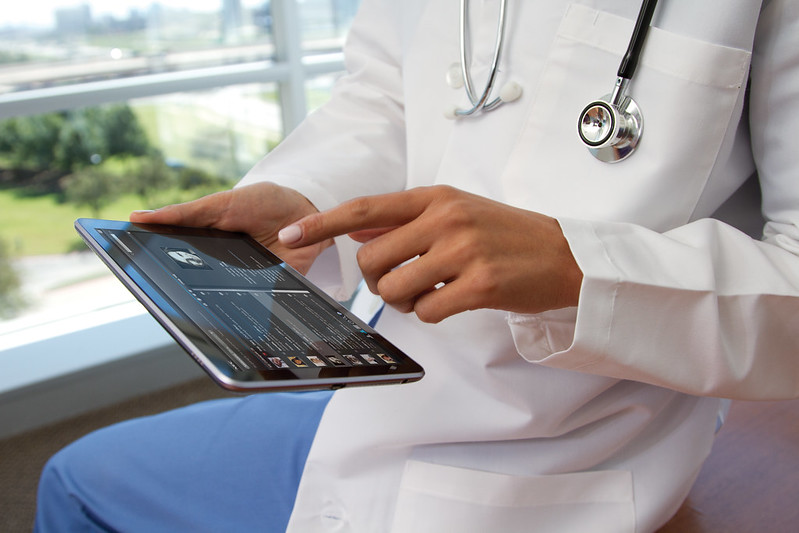In the future — and it’s nearer than you might think — medical patients will be outfitted with tech at the first sign of disease that will stream data to their care team in real time.
If, for instance, there’s an abnormality such as an irregular heartbeat or blood sugar drop, an alert is sent and the care team can address it immediately, no matter where that patient is or whether they notice something is off themselves.
As medicine and medical devices evolve at a rapid pace, digitally identifying what does and doesn’t work for an individual patient and making adjustments as needed — as opposed to, say, prescribing a treatment and following up in six months — is where healthcare is headed, said Randall Gaboriault, chief digital and information officer and senior VP of innovation and strategic development at ChristianaCare.
“I strongly believe two healthcare truths: All care will be digital, except for that which can not be, and all care will be delivered in the home, except that which cannot be,” Gaboriault told Technical.ly.
This may sound expensive, in a time when rising medical costs are having a negative affect on many Americans, but in reality, this shift, coupled with a value-based model in which companies that provide medical technology to healthcare systems are paid based on outcome, could lower healthcare costs across the board.
According to Gaboriault, “81% of hospital beds are filled with people suffering from chronic diseases, often unmanaged. As the venue of care becomes digital and home-based, it absolutely lowers the cost of healthcare. At this point, we have no choice.”
ChristianaCare is adopting these models earlier and faster than most other healthcare systems around the country, the chief said — a benefit of being located in a small state where relationships between caregivers, community and legislators are uncommonly close. It’s been incorporating a value-based model with payers such as insurance companies and software.
What we seek to do with Medtronic is change that to where they actually have an accountability in the outcome, so we're paying for full value only when full value has been created.
This week, ChristianaCare announced a value-based partnership with a medical device producer, Medtronic, one of the largest companies of its kind in the world.
Medtronic products have long been used by ChristianaCare, along with most every healthcare provider. The use of the products will stay pretty much the same, but the model is strikingly different.
“The model has been such that you go to market as a buyer and say we need X number of devices because this is the demand in our community. You try to forecast,” Gaboriault said. “With the traditional model, the fundamental flaw is that you’re paying full freight. When we buy that device, we’re paying for it based on the promise of the outcome. Whether the outcome is achieved or not, you’ve paid full value for that product.”
With a value-based model, it’s different.
“What we seek to do with Medtronic is change that to where they actually have an accountability in the outcome, so we’re paying for full value only when full value has been created,” he said.
It’s a complicated healthcare philosophy, he acknowledges.
“I came out of the medical device industry, I worked in aircraft engine manufacturing, and with those industries, we have a concept of standardized inputs, standardized process and standardized outputs in producing a product,” Gaboriault said. “In healthcare, you have this deep complexity [because] people are different. You have this inherent variation that creates this complexity.”
Machine learning will play a part, too, in determining which interventions produce results in which types of individuals.
In this model, both the healthcare provider and the (in this case) device provider that was previously paid upfront take on risk.
“This isn’t, ‘We didn’t get the outcome, they’re going to give us a 5% discount,'” said Gaboriault. “This is a fundamental shift where if you didn’t get the outcome, you don’t pay. That’s the spirit of the concept. We’re in it together to get a shared outcome.”
For device companies, the data created can help them develop more effective products faster.
And while no model works for 100% of patients, Gaboriault notes that if primarily digital and at-home care works for most, resources are freed up to allow the system to invest in the others.
“We have the ability to change and transform healthcare in our backyard in Delaware,” he said. “We believe we can move faster than others are moving in their ecosystems. It’s the Delaware advantage.”
Join the conversation!
Find news, events, jobs and people who share your interests on Technical.ly's open community Slack

Delaware daily roundup: Delmarva Power vendor stats; DelDOT's $15M federal grant; 50 best companies to work for

Delaware daily roundup: Over 4,000 Black-owned businesses uncovered; Dover makes rising cities list; a push for online sports betting

Delaware daily roundup: Ladybug Fest illuminates small biz; Hahnemann Hospital's biotech future; intl. politics and a Middletown project


